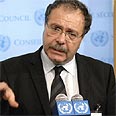
Lebanon: We’ll deploy army in south
Lebanon's acting foreign minister presents UN with long-term solution for country, including withdrawal of Israeli army, disarmament of militias. Ambassador Gillerman: Isn’t it time that Lebanon take its fate into its own hands and not cry out to the Security Council?
A top Lebanese official asked the UN Security Council on Monday for an international inquiry into the Israeli raid on the southern Lebanese village of Qana that killed at least 54 civilians, mostly children.
Tareq Mitri, Lebanon's acting foreign minister, also renewed a government plea for an immediate end to the fighting between Israel and Hizbullah, which has raged since July 12.
"The onslaught continues unabated. It has to stop," Mitri, who is also Lebanon's culture minister, told the council.
Lebanese Prime Minister Fouad Siniora sent his most outspoken minister for a heated debate at the United Nations instead of Foreign Minister Fawzi Salloukh, a Hizbullah associate.
Mitri presented a plan for a long-term solution for Lebanon which included seven points:
1- The release of Israeli and Lebanese prisoners through the International Red Cross
2- The withdrawal of the Israeli army to the internationally recognized border and the return of displaced Lebanese to south Lebanon
3- Mandating a UN control of the disputed Shebaa Farms until Lebanon's final borders are demarcated
4- The deployment of the Lebanese army in southern Lebanon and the disarmament of all militias
5- The United Nations sends urgent humanitarian aid to southern Lebanon
6- UN oversees demarcation of 1949 international borders between Israel and Lebanon
7- International community helps rebuilding Lebanon
While US Secretary of State Condoleezza Rice said a ceasefire could be forged this week, Israel said on Monday it would not stop fighting despite an international outcry over its deadly air strike on a building in the village of Qana a day earlier.
Israel said it was unaware civilians had been in the building and accused Hizbullah of launching rockets from Qana.
It asserted its right to self-defense after Hizbullah crossed over into Israel 19 days ago to seize two Israeli
soldiers and later rained rockets on northern Israel.
"Some of us are tired of listening to a kind of self-righteous discourse about self-defense," Mitri said. "We have heard ad nauseum that in wars mistakes are committed."
'Tyrants in the north'
But he said there was "a pattern of behavior" in repeated Israeli actions against Lebanon. "You are all aware that none of those aggressions achieved its stated aim," he added.
Lebanon's council of ministers, he said, had approved a plan to end the conflict, which included an immediate
ceasefire, a withdrawal of Israeli forces from Lebanon, a release of Lebanese and Israeli prisoners, and deployment of an international peacekeeping force in southern Lebanon.
The plan also would put the Israeli-occupied Shebaa Farms, an area the United Nations says is part of Syria, under UN control until claims of Lebanese sovereignty are resolved.
Israeli UN Ambassador Dan Gillerman, in a drawn-out tit-for-tat exchange with Mitri, said he agreed with much of what the Lebanese official said.
He stressed, however, that Israel had no territorial designs on Lebanon but was forced to act against a "monstrosity" - an apparent reference to Hizbullah.
Lebanon had first been taken over by "tyrants in the north namely Syria," then "taken hostage by terrorists of the worst kind - the Palestinian Liberation Organization in the 1980s and Hizbullah in the 1990s," he said. "Isn't it time that Lebanon took its fate into its own hands (and) not cry out to the Security Council?"
News agencies contributed to the report










